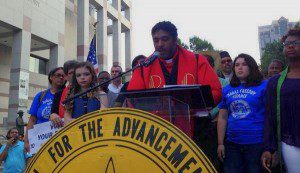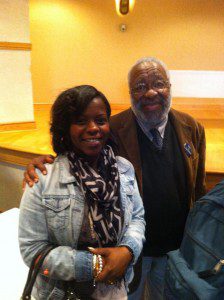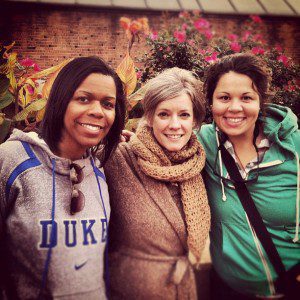I met Jesse DeConto when he was a reporter covering faith-based resistance to the death penalty in North Carolina. We caught up a few years later and wrote a piece for The Christian Century on Project TURN, the prison-based education program that School for Conversion runs. As both a writer and a musician, Jesse keeps his eyes open for signs of God’s kingdom breaking into our world. I’m glad to share this testimony about how God is showing up in his life.
By Jesse James DeConto
On Trinity Sunday in June 2007, I went to a little church that met in a photographer’s studio above a coffee shop in a historic business district near Duke University in Durham, N.C. We sat around a circle, on couches or big cushy chairs, and a pro musician, Wade Baynham, who had built a regional following on the West Coast with his band The Basics before moving to Durham, led us in singing music from Over the Rhine and U2–songs seeking spiritual meaning in everyday human experiences.
I’d met Wade while working on a freelance story for The News & Observer about another local musician, “Randy” who had played on Letterman and Leno and toured Europe with an extremely successful Christian crossover band before an angry split in Nashville and his new career teaching drum lessons and preschool in Durham. I’d hung out with the two of them while Randy recorded drums for a client’s record in Wade’s home studio. Between Wade and Randy and this tiny fellowship, I’d hoped to find the real friendship I thought might save my terminally-ill marriage.
“Emergent” or postmodern churches like this one tend to attract worshippers in their 20s and 30s who think they hear a divine call to love each other and the world around them but at the same time doubt the human ability to understand anything God might have to say. There is no magisterium or dogmatic priest to interpret and explain the world or the Bible with any absolute authority. The people, with all their strengths and shortcomings, success and suffering, idiosyncrasies and expertise, together in conversation with sacred texts and Christian tradition try to figure how to follow Jesus in the 21st century.
The name of this particular group, Emmaus Way, comes from a story in the Gospel of Luke where two of Jesus’ followers meet him on the road to a Jewish town called Emmaus and don’t recognize him until after they offer him hospitality as a lonely traveler. “As he sat at meat with them, he took bread, and blessed it, and brake, and gave to them. And their eyes were opened, and they knew him.” Emergent churches are built on the idea that spiritual truth depends upon experience in community, that God is known in relationship, especially sharing meals together, an idea that had motivated so much idealism back on my wedding day.
But there was something more than just the transparency of sitting in a small room, looking at one another across an intimate circle. Wade had gone through a divorce — with his songwriting partner of 20 years, no less – and had just remarried that spring. Randy had absorbed bitter conflict in the Christian-music industry that was supposed to be telling a story of love. They had watched hope disintegrate before their eyes, yet they were still here, helping us worship, not denying the pain, but looking for God in it, as though God hadn’t been the one to let them down but was, instead, the Comforter who knew suffering on the cross and could walk through it with them. On this Trinity Sunday, Wade led us in a song, a prayer he’d written after his mother’s suicide when he was 17 years old:
Will you feel with me the feelings that I feel?
Will you help me tell what’s not and what is real?
Will you be the one to save me from my fear?
Will you save, will you save me?
Will you save, will you save me?
For me, at that point, salvation wasn’t just finding hope or making the best of bad circumstances. I thought our marriage could be redeemed. In our counseling sessions, I had seen how my wife’s need to be taken care of and my need to take care had whisked us into a toxic soup. She couldn’t help but whine, nag and sigh about all the disappointments of her life. I couldn’t help but try to fix them. She couldn’t help but be disappointed in my fixes, because what was broken was inside of her. I couldn’t help but sink into depression, a failure. She couldn’t help but pile on more complaints. I couldn’t help but explode in rage, once every couple of months or so, screaming about her humble suggestion that salt would help the water boil faster.
The answer, of course, was for her to deal with her brokenness and for me to deal with mine. So what if she believed in the death penalty? So what if she didn’t like compact-fluorescent lightbulbs or want to live in a Christian commune? Maybe we just spent money differently. Maybe we just thought differently about what God wanted from us – how we were supposed to treat others and the environment, what value we put on material things versus people. Maybe I’d become just another liberal fundamentalist, and she had every right to feel judged, as she said she did, by what I left unsaid.
“God’s very being is a being that’s in relationship with himself, you know, Father, Son, Holy Spirit, eternally in relationship with himself,” said Trigger, a skater-theologian, bald-headed and baggy-pantsed, one of several Duke Divinity students at Emmaus Way.
Pastor Tim had prompted us to reflect on the Trinity.
“It’s just interesting that there’s this otherness, in a sense, within God, and it’s kind of like the way that we relate to each other in a body,” Trigger went on. “It’s engaging with the other, it’s like the Trinity itself can be a model for church relationships, human sexual relationships, all sorts of other types of relationships can be understood in a Trinitarian way of thinking.”
Eternally in relationship, yes. But how had I missed that “otherness” aspect of the Trinity and how it served as a model for marriage?
“The Trinity is difference and intimate unity,” Tim said. “The best way to get some really bad theology is to grab one of those two but not the other. Unity often means, ‘We’ll do it my way, and we’ll feel good about it.’”
“Preach it, brother.”
I didn’t really say that. Emergents don’t say that sort of thing. But I could have. Tim hit me square between the eyes.
“Unity and difference radically changes a whole philosophy of partnership,” Tim said. “Our whole philosophy of ministry should be that of embracing difference, letting different be different, and in some way fashioning intimacies in that difference.”
Yes. Yes. How had I missed that back on my wedding day? Yes, Tim said, paraphrasing C.S. Lewis, God does invite us into the Triune life, but we have limits.
“We can’t do that as human beings,” he said. “I can’t say that my life is intimately in your life. I can’t say that, because I’m not divine. We are not a Trinity. We don’t relate in the way God does.”
That Trinity Sunday was a turning point in my life, when I started to admit that I would never see the perfect image of God in myself or anyone else. I would see it only through a glass darkly. And once you admit that, you can start to give and receive grace. That is, once you stop chasing the image of God, you might find it’s not that far away.
Jesse James DeConto is a writer and musician in Durham, N.C. He is working on a book of creative nonfiction, tentatively titled This Littler Light: Finding Grace in the Dark. Read more at jessejamesdeconto.com.











